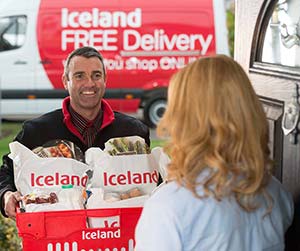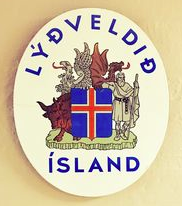After peacefully coexisting since 1970, the Republic of Iceland has taken legal action against UK supermarket operator Iceland Foods in an attempt to force the chain, which specializes in frozen products, to change its name.
“The government, along with SA Business Iceland and Promote Iceland, is taking this step because Iceland Foods has aggressively pursued and won multiple cases against Icelandic companies which use ‘Iceland’ in their representation or as part of their trademark, even in cases when the products and services do not compete,” declared Iceland’s Ministry for Foreign Affairs in a recently issued statement.
The British retailer issued a statement of its own in response to the lawsuit, as follows: “We will vigorously defend Iceland Foods’ established rights where there is any risk of confusion between our business and Iceland the country. We have been trading successfully for 46 years under the name Iceland. We do not believe that any serious confusion or conflict has ever arisen in the public mind, or is likely to do so.”
 A pan-European trademark registration for the word mark “Iceland” is held by Deeside, Flintshire, Wales-headquartered Iceland Foods. The Icelandic government’s legal challenge at the European Union Intellectual Property Office (EU-IPO) seeks to invalidate this exclusive registration on the basis that the term “Iceland” is exceptionally broad and ambiguous in definition, often rendering the country’s firms unable to describe their products as Icelandic.
A pan-European trademark registration for the word mark “Iceland” is held by Deeside, Flintshire, Wales-headquartered Iceland Foods. The Icelandic government’s legal challenge at the European Union Intellectual Property Office (EU-IPO) seeks to invalidate this exclusive registration on the basis that the term “Iceland” is exceptionally broad and ambiguous in definition, often rendering the country’s firms unable to describe their products as Icelandic.
“The Government of Iceland is concerned that our country’s businesses are unable to promote themselves across Europe in association with their place of origin – a place of which we are rightly proud and enjoys a very positive national branding. This untenable situation has caused harm to Icelandic businesses, especially its small and growing companies. A company or product made in Iceland or by an Icelandic company should be able to represent itself using the name of the country,” declared the Ministry for Foreign Affairs.
According to the Ministry, the Republic of Iceland has made multiple efforts to negotiate with Iceland Foods over the years “with the hope of reaching a fair solution and avoiding legal action. These conciliatory efforts have unfortunately been met with unrealistic and unacceptable demands by the supermarket chain, leaving Iceland with no choice but to proceed with a legal resolution to the situation.”
On November 29, Iceland Foods CEO Malcolm Walker announced that a high-level delegation from his company is preparing to fly to Reykjavik this week to begin negotiations.
“We very much hope for a positive response and an early resolution of this issue,” he said. “We registered Iceland as our company name in 1970 and we have coexisted with the country called Iceland very happily ever since. They have made no contact with us to raise any concerns about trademark issues since 2012.”
Walker continued, “We have no desire whatsoever to stand in the way of Iceland the country making use of their own name to promote their own products, so long as it does not conflict or cause confusion with our own business. I am sure there is ample scope for an agreement that will allow both parties to continue to live and work amicably alongside each other.”
The case before the EU-IPO will be closely watched by trademark lawyers and corporate identity defenders, as Iceland is an iconic brand that has long been established on the British food retail scene.
According to the iceland.co.uk website: “Though sometimes confused with a small country of Viking origins on the fringes of the Arctic Circle, the real Iceland is a unique British food retailer with over 860 stores throughout the UK, a further 40 owned or franchised stores across Europe, and a global export business.”
The “Early Days” section of the company’s history on the website states: “Iceland sprang to life when Malcolm Walker and another bored, young retailer decided to open a shop in an attempt to make their fortunes. They raised initial capital of just £60 to pay one month’s rent and opened the very first Iceland in Oswestry, Shropshire, in November 1970. In those days, before domestic fridges and freezers became commonplace, Iceland specialized in selling loose frozen food.”
Almost half a century later, in the year ending March 26, 2016, the company’s receipts totaled £2.675 billion. The figure showed an improvement in like-for-like sales performance compared with the prior year, an increase in adjusted EBITDA to £150.5 million, and higher cash balances of £164.9 million.
Interestingly, back in 2012 the future of Iceland Foods endured a prolonged period of uncertainty caused by the liquidators of two failed Icelandic banks that placed their 77% shareholding in the business up for auction. At the time CEO Walker acted to conclude a successful £1.45 billion management buyout, backed by co-investors Brait S.A., Lord Kirkham and The Landmark Group.
As for Iceland the country, it was settled by Norwegian-Norse Chieftain Ingolfr Arnarson in the year 874 and governed as an independent commonwealth until accession to Norwegian rule in the 13th Century. Thereafter came the imposition of Danish rule in 1814, followed by independence in 1918 and the founding of a republic in 1944.
The Iceland brand name, beyond the retail chain, has been associated with frozen fishery products – especially outside of Europe. In North America, Iceland Seafood Corporation and Icelandic Seafoods spearheaded distribution of the nation’s frozen fish products in the foodservice market.
Icelandic established its first overseas sales agency in New York in 1945. Nine years later it launched a premium brand called Icelandic Seafood. In 1968, a new processing facility opened in Cambridge, Maryland. It was there where Icelandic pioneered the mass-production of the battered fish portion.
In 2005, a major milestone was reached when Samband of Iceland Corp. (formerly Iceland Seafood Corporation) merged with Icelandic USA Inc. In 2011, Icelandic Group sold its subsidiary, Icelandic USA, to Halifax, Nova Scotia, Canada-headquartered High Liner Foods Inc. – Reported by John Saulnier





